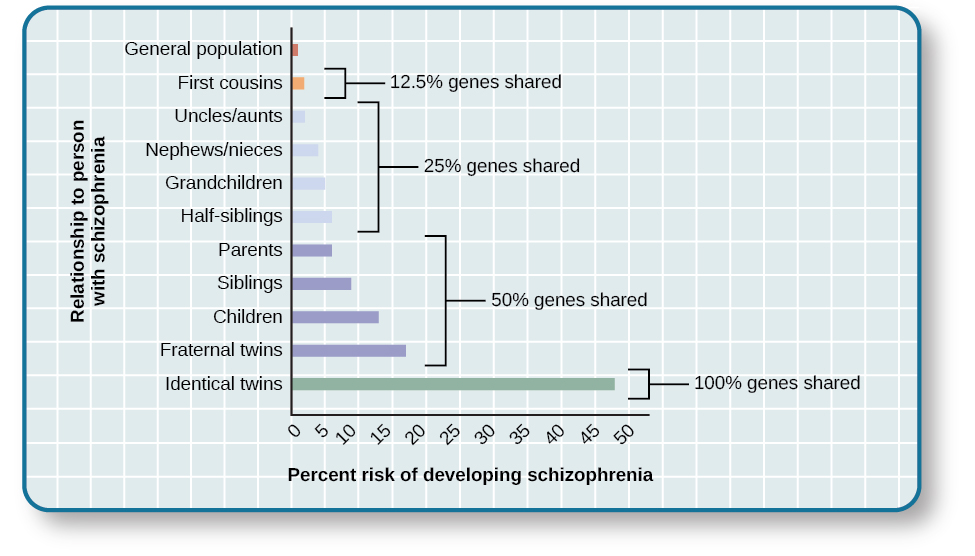| << Chapter < Page | Chapter >> Page > |
The biological perspective views psychological disorders as linked to biological phenomena, such as genetic factors, chemical imbalances, and brain abnormalities; it has gained considerable attention and acceptance in recent decades (Wyatt&Midkiff, 2006). Evidence from many sources indicates that most psychological disorders have a genetic component; in fact, there is little dispute that some disorders are largely due to genetic factors. The graph in [link] shows heritability estimates for schizophrenia.

Findings such as these have led many of today’s researchers to search for specific genes and genetic mutations that contribute to mental disorders. Also, sophisticated neural imaging technology in recent decades has revealed how abnormalities in brain structure and function might be directly involved in many disorders, and advances in our understanding of neurotransmitters and hormones have yielded insights into their possible connections. The biological perspective is currently thriving in the study of psychological disorders.
Despite advances in understanding the biological basis of psychological disorders, the psychosocial perspective is still very important. This perspective emphasizes the importance of learning, stress, faulty and self-defeating thinking patterns, and environmental factors. Perhaps the best way to think about psychological disorders, then, is to view them as originating from a combination of biological and psychological processes. Many develop not from a single cause, but from a delicate fusion between partly biological and partly psychosocial factors.
The diathesis-stress model (Zuckerman, 1999) integrates biological and psychosocial factors to predict the likelihood of a disorder. This diathesis-stress model suggests that people with an underlying predisposition for a disorder (i.e., a diathesis) are more likely than others to develop a disorder when faced with adverse environmental or psychological events (i.e., stress), such as childhood maltreatment, negative life events, trauma, and so on. A diathesis is not always a biological vulnerability to an illness; some diatheses may be psychological (e.g., a tendency to think about life events in a pessimistic, self-defeating way).
The key assumption of the diathesis-stress model is that both factors, diathesis and stress, are necessary in the development of a disorder. Different models explore the relationship between the two factors: the level of stress needed to produce the disorder is inversely proportional to the level of diathesis.
Psychopathology is very complex, involving a plethora of etiological theories and perspectives. For centuries, psychological disorders were viewed primarily from a supernatural perspective and thought to arise from divine forces or possession from spirits. Some cultures continue to hold this supernatural belief. Today, many who study psychopathology view mental illness from a biological perspective, whereby psychological disorders are thought to result largely from faulty biological processes. Indeed, scientific advances over the last several decades have provided a better understanding of the genetic, neurological, hormonal, and biochemical bases of psychopathology. The psychological perspective, in contrast, emphasizes the importance of psychological factors (e.g., stress and thoughts) and environmental factors in the development of psychological disorders. A contemporary, promising approach is to view disorders as originating from an integration of biological and psychosocial factors. The diathesis-stress model suggests that people with an underlying diathesis, or vulnerability, for a psychological disorder are more likely than those without the diathesis to develop the disorder when faced with stressful events.
Even today, some believe that certain occurrences have supernatural causes. Think of an event, recent or historical, for which others have provided supernatural explanation.

Notification Switch
Would you like to follow the 'Psychology' conversation and receive update notifications?